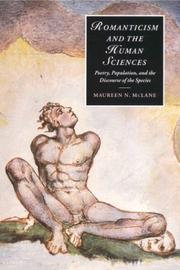| Listing 1 - 2 of 2 |
Sort by
|
Book
ISBN: 9781501710704 1501710702 1501710710 1501710729 9781501710728 9781501710711 1501761714 Year: 2018 Publisher: Ithaca, NY
Abstract | Keywords | Export | Availability | Bookmark
 Loading...
Loading...Choose an application
- Reference Manager
- EndNote
- RefWorks (Direct export to RefWorks)
From the teeming streets of Dickens's London to the households of domestic fiction, nineteenth-century British writers constructed worlds crammed beyond capacity with human life. In 'Populating the Novel', Emily Steinlight contends that rather than simply reflecting demographic growth, such pervasive literary crowding contributed to a seismic shift in British political thought. She shows how the nineteenth-century novel in particular claimed a new cultural role as it took on the task of narrating human aggregation at a moment when the Malthusian specter of surplus population suddenly and quite unexpectedly became a central premise of modern politics. In readings of novels by Mary Shelley, Elizabeth Gaskell, Charles Dickens, Mary Braddon, Thomas Hardy and Joseph Conrad that link fiction and biopolitics, Steinlight brings the crowds that pervade nineteenth-century fiction into the foreground.
English fiction --- Population in literature --- Fertility, Human, in literature --- Malthusianism --- History and criticism --- Malthusianism. --- Fertility, Human, in literature. --- Population in literature. --- Eugenics --- Population --- History and criticism. --- population in nineteenth century literature, Victorian biopolitics, Victorian fiction and the masses, the nineteenth century British novel and demography, Malthus and literature.

ISBN: 0521773482 0511310501 0511151144 128015473X 0511049943 0511484399 0511118511 1107119901 0511010842 9780511010842 0511034695 9780511034695 9780511118517 9780521773485 9780511484391 9780511049941 9780511151149 9781280154737 9780521028202 0521028205 Year: 2000 Publisher: Cambridge [England] ; New York : Cambridge University Press,
Abstract | Keywords | Export | Availability | Bookmark
 Loading...
Loading...Choose an application
- Reference Manager
- EndNote
- RefWorks (Direct export to RefWorks)
This study, published in 2000, examines the dialogue between Romantic poetry and the human sciences of the period. Maureen McLane reveals how Romantic writers participated in a new-found consciousness of human beings as a species, by analysing their work in relation to discourses on moral philosophy, political economy and anthropology. Writers such as Wordsworth, Coleridge, Mary Shelley and Percy Shelley explored the possibilities and limits of human being, language and hope. They engaged with the work of theorisers of the human sciences - Malthus, Godwin and Burke among them. The book offers original readings of canonical works, including Lyrical Ballads, Frankenstein and Prometheus Unbound, to show how the Romantics internalised and transformed ideas about the imagination, perfectibility, immortality and population which so energised contemporary moral and political debates. McLane provides a defence of poetry in both Romantic and contemporary theoretical terms, reformulating the predicament of Romanticism in general and poetry in particular.
English literature. --- English literature - 19th century - History and cr. --- Literature and anthropology. --- Literature and society. --- Population in literature. --- Romanticism. --- Social problems in literature. --- Social sciences. --- English literature --- Literature and society --- Literature and anthropology --- Social sciences --- Social problems in literature --- Romanticism --- Population in literature --- English Literature --- English --- Languages & Literatures --- History and criticism --- History --- History and criticism. --- Behavioral sciences --- Human sciences --- Sciences, Social --- Social science --- Social studies --- Anthropology and literature --- Civilization --- Anthropology --- Arts and Humanities --- Literature
| Listing 1 - 2 of 2 |
Sort by
|

 Search
Search Feedback
Feedback About UniCat
About UniCat  Help
Help News
News